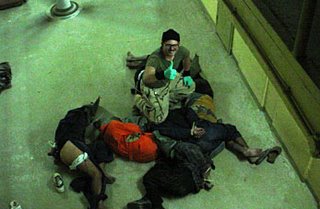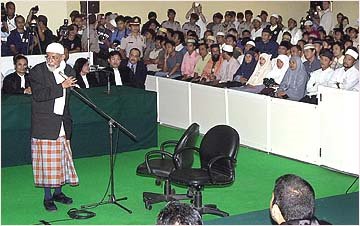 THE ISRAELI SOLDIER - Nothing Special About Him
THE ISRAELI SOLDIER - Nothing Special About Him
Humbling of the supertroops shatters Israeli army morale
By Uzi Mahnaimi, Tel Aviv
HUNDREDS of feet below ground in the command bunker of the Israeli air force in Tel Aviv, a crowd of officers gathered to monitor the first day of the war against Hezbollah. It was July 12 and air force jets were about to attack Hezbollah’s military nerve centre in southern Beirut.
Among the officers smoking tensely as they waited for news, was Lieutenant-General Dan Halutz, 58, a daring fighter pilot in the 1973 Arab-Israeli war who had become chief of staff a year earlier and now faced the biggest test of his career.
Over the Mediterranean, west of Beirut, the elite F-15I squadron made its final preparations to strike with precision guided weapons against Hezbollah’s Iranian-made long-range Zelzal rockets, aimed at Tel Aviv.
Just before midnight, the order “Fire!” — given by the squadron leader — could be heard in the Tel Aviv bunker. Within moments the first Hezbollah missile and launcher were blown up. Thirty-nine tense minutes later the squadron leader’s voice was heard again: “Fifty-four launchers have been destroyed. Returning to base.”
Halutz smiled with relief and called Ehud Olmert, the prime minister, who was enjoying a cigar as he waited by a secure red phone at his residence in Jerusalem.
“All the long-range rockets have been destroyed,” Halutz announced proudly. After a short pause, he added four words that have since haunted him: “We’ve won the war.”
Even as Halutz was declaring victory, 12 Israeli soldiers from the Maglan reconnaissance unit were already running into an ambush just over the border inside Lebanon near the village of Maroun a-Ras.
“We didn’t know what hit us,” said one of the soldiers, who asked to be named only as Gad. “In seconds we had two dead.”
With several others wounded and retreating under heavy fire the Maglans, one of the finest units in the Israeli Defence Forces (IDF), were astonished by the firepower and perseverance of Hezbollah.
“Evidently they had never heard that an Arab soldier is supposed to run away after a short engagement with the Israelis,” said Gad.
“We expected a tent and three Kalashnikovs — that was the intelligence we were given. Instead, we found a hydraulic steel door leading to a well-equipped network of tunnels.”
As daylight broke the Maglans found themselves under fire from all sides by Hezbollah forces who knew every inch of the terrain and exploited their knowledge to the full.
The commander of the IDF’s northern sector, Lieutenant-General Udi Adam, could barely believe that some of his best soldiers had been so swiftly trapped; neither could the chief of staff.
“What’s wrong with the Maglans?” Halutz demanded to know. “They are surrounded,” Adam replied quietly. “I must send in more forces.”
As the reinforcements of the Egoz brigade prepared to enter Maroun a-Ras and rescue their comrades, however, several were mown down in a second ambush. Hours of battle ensued before the Maglan and Egoz platoons were able to drag their dead and wounded back to Israel.
Hezbollah also suffered heavy casualties but its fighters slipped back into their tunnels to await the next round of fighting. It was immediately obvious to everyone in Tel Aviv that this was going to be a tougher fight than Halutz had bargained for.
As the war unfolded his optimism was brought crashing down to earth — and with it the invincible reputation of the Israeli armed forces.
In five weeks, their critics charge, they displayed tactical incompetence and strategic short-sightedness. Their much-vaunted intelligence was found wanting.
Their political leadership was shown to vacillate. Their commanders proved fractious. In many cases the training of their men was poor and their equipment inadequate. Despite many individual acts of bravery, some of the men of the IDF were pushed to the point of mutiny.
Last week, in an contrite letter to his soldiers, Halutz admitted to “mistakes which will all be corrected”. It is far from clear whether Halutz will remain in position to correct them.
As calls mounted this weekend — not least from the families of many of the 117 fallen Israeli soldiers — for the resignation of those deemed responsible for the failures, Olmert was expected to set up an inquiry into the conduct of the war. A poll showed that 63% of Israelis believed Olmert should quit, while 74% called for Amir Peretz, the defence minister, to go, and 54% wanted Halutz out.
“Olmert faces a serious risk of a no-confidence vote in the Knesset,” said Hanan Kristal, a leading political commentator. “A State Commission will give him four to six months of critical breathing time.”
Meanwhile the Israeli public are struggling to accept that the country’s security might now depend on whether a French-led United Nations peacekeeping force proves able to disarm Hezbollah in southern Lebanon. In addition to 7,000 troops already promised by EU states, the UN has received offers from several Muslim countries, some of which do not even recognise Israel. The force is unlikely to reach full strength for at least two months.
Much attention is being paid, however, to the deployment of these forces and especially to Israel’s apparent over-reliance on air power under the command of the Halutz.
Critics of Halutz, a former air force commander, believe he should have sent in overwhelming forces on the ground to drive Hezbollah back from border areas where they remained active right up to the end of the 34-day conflict.
“The air force can only assist ground forces; it can never win a war — any war,” said one veteran Israeli officer last week.
Another critical factor under consideration was that Hezbollah seemed so much better prepared. They launched nearly 200 rockets a day at Israel. They used advanced anti-tank missiles with lethal professionalism and stunned their opponents with their coolness under pressure and their willingness to “martyr” themselves in battle.
Apparently using techniques learnt from their paymasters in Iran, they were even able to crack the codes and follow the fast-changing frequencies of Israeli radio communications, intercepting reports of the casualties they had inflicted again and again. This enabled them to dominate the media war by announcing Israeli fatalities first.
“They monitored our secure radio communications in the most professional way,” one Israeli officer admitted. “When we lose a man, the fighting unit immediately gives the location and the number back to headquarters. What Hezbollah did was to monitor our radio and immediately send it to their Al-Manar TV, which broadcast it almost live, long before the official Israeli radio.”
Hezbollah appears to have divided a three mile-wide strip along the Israeli-Lebanese border into numerous “killing boxes”. Each box was protected in classic guerrilla fashion with booby-traps, land mines, and even CCTV cameras to watch every step of the advancing Israeli army.
“Our brass stupidly fell into the Hezbollah traps,” said Raphael, an infantry battalion reserve major. “The generals wanted us to attack as many villages as possible for no obvious reason. This was exactly what Hezbollah wanted us to do — they wanted to bog us down in as many small battles as possible and bleed us this way.”
The casualties from Russian-made anti-tank missiles have caused particular concern. An Israeli-invented radar defence shield codenamed Flying Jacket and costing £200,000 was installed on only four tanks. None of them was struck by anti-tank missiles.
But Hezbollah hit 46 tanks that lacked the shield. “£200,000 per tank is not beyond Israel’s means,” noted one military source acidly.
While the regular army was reasonably well equipped, the reservists were not. “We arrived at our depots only to find that our combat gear had been opened and equipment given to regular soldiers,” revealed Moshe, a fighter in the Alexandroni brigade. “The equipment was, of course, never returned.”
The Alexandroni fought in the west, near the Mediterranean, and did well initially. But logistics were appalling. “We had no fresh water as it was too dangerous to ship it to us,” Moshe added. “I’m ashamed to admit we had to drink water from the canteens of dead Hezbollah, and break into local shops for food.”
The Israeli leadership became determined to destroy the Hezbollah stronghold of Bint Jbeil because of its powerful symbolism to the enemy.
This was the place where Sayyed Hassan Nasrallah, Hizbollah’s general secretary, had given his keynote speech after Israel withdrew in 2000, ending 18 years of occupation. Nasrallah said in Bint Jbail that Israel would be destroyed. Now Israeli leaders wanted to show him how badly mistaken he had been.
“Conquer Bint Jbail,” Halutz told Adam, the northern sector commander. Adam is said to have replied: “Hold on, Halutz. Do you know what that means? Do you realise that the casbah [old quarter] of Bint Jbail alone contains more than 5,000 houses? And you want me to send in one battalion?”
Adam nevertheless did as he was told and sent the 51st battalion of the Golani brigade to fight a heroic but hopeless, battle.
As the Israeli soldiers approached the town from the east they fell straight into yet another ambush. Hand grenades killed battalion commanders. Then a rescue operation was mounted, which took all night.
Hezbollah fighters were also hit but retreated and waited for Israeli reinforcements to arrive. Brig Gen Gal Hirsch, the commander of the 91 Galilee division, announced: “We control Bint-Jbail.” The next day more Israeli soldiers died as they, too, were ensnared in Hezbollah’s trap.
The Israeli media began to attack the army. “Idiotic military manoeuvres,” was how one commentator on TV1, the state-owned station, summed it up.
Tension now set in among the top brass. Halutz dispatched his deputy, Maj Gen Moshe Kaplinsky, as his special representative to the north, placing him above Adam.
Adam threatened to resign if Kaplinski issued orders to his units. Kaplinski nevertheless did so. Adam did not resign but is expected to go public soon with his story of the war.
Relatively inexperienced reservists were called up. Oded, 27, a reservist from Jerusalem in a combat infantry brigade, was among those summoned to active duty. “In the past six years I’ve only had a week’s training,” he revealed.
“Soon after we arrived, we received an order to seize a nearby Shi’ite village. We knew that we were not properly trained for the mission. We told our commanders we could control the village with firepower and there was no need to take it and be killed for nothing.
“Luckily we were able to convince our commander,” he concluded with a faint smile.
Oded blamed the Palestinian intifada for his unit’s insufficient training. “For the last six years we were engaged in stupid policing missions in the West Bank,” he said. “Checkpoints, hunting stone-throwing Palestinian children, that kind of stuff. The result was that we were not ready to confront real fighters like Hezbollah.”
On the day the chaos in Bint Jbail reached its peak, Amir Peretz, the new and inexperienced defence minister, flew to the northern border to meet reservists about to go into action.
Aviv Wasserman, a reserve major with the 300 brigade who is about to study for a doctorate at the London School of Economics, asked Peretz not to throw them into “unnecessary adventures”.
Lieutenant Adam Kima, of the combat engineering battalion, was in even more rebellious mood after being asked to take his men and clear the road leading to Bint Jbeil from the west. Studying the plan, Kima rejected the idea — 10 Israeli soldiers had already died there “We were foolishly told it was all right — there are no Hezbollah forces ahead of us,” said Corporal Nimrod Diskin, one of Kima’s soldiers. “We didn’t have the equipment to clear this road. We were not ready for the mission.”
When the brigade commander realised that Kima and his soldiers would not carry out their orders, he called the military police. The men were sentenced to 14 days in jail, although they were released a few days later. The soldiers, most of them fathers of small children, believe Kima saved their lives.
“I noticed behaviour I’d never heard of in the Israeli army,” Kima said last week on Israeli television. “In my training I got used to the idea that the commander shouts ‘Advance!’ and is the first to face the enemy. Here my battalion commander was in the back of the group and the brigade commander didn’t even cross the border into Lebanon.”
As the fighting dragged on, some veteran officers lost patience with what they saw as the inexperience of the chief of staff and defence minister. “What are you doing in Lebanon, for God’s sake?’ the former defence minister, General Shaul Mofaz, asked Olmert. “Why did you go into Bint Jbeil? It was a trap set by Hezbollah.”
Mofaz proposed an old-fashioned IDF assault plan to launch a blitzkrieg against Hezbollah, reach the strategically important Litani river in 48 hours and then demolish Hezbollah in six days. Olmert liked the idea but Peretz did not appreciate his predecessor’s intervention and rejected it.
Olmert appeared to lose confidence and began to issue conflicting orders. “Our mission changed twice, three times, every day,” complained one soldier.
Many Israelis have been left furious that the legendary deterrent power of their army has been shattered. Even though Hezbollah has lost a quarter of its fighters, its military base in Beirut and its bunkers in the south, Israelis feel less secure.
They hear President Bashar al-Assad of Syria warning that he may retake the Golan Heights by force and the Iranians threatening that if the Americans attack them, Tel Aviv will be hit by ballistic missiles in retaliation.
On the final day of the war, Halutz was sitting in his favourite seat at the air force bunker in Tel Aviv, waiting for the results of a massive airborne operation. Then the news came through that a Sikorsky CH-53 helicopter had been shot down by a Hezbollah rocket. He is said to have felt defeated, both personally and professionally.
Halutz and his political masters may now be living on borrowed time. Israeli’s military elite, such as its fighter squadrons and commando units, may still be among the best in the world but the mediocrity of much of the army has been exposed for all in the Middle East to see.
Israelis can forget and forgive many things, but not the perceived defeat of an army that commanded worldwide respect but suddenly no longer strikes so much fear into its enemies.
Source: Timesonline.co.uk





